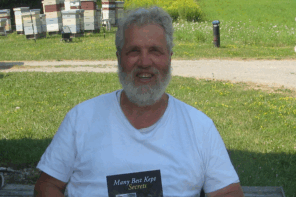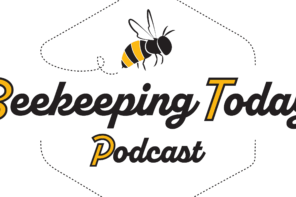Keeping Bees In Vermont Without Treatments Of Any Kind
by Ross Conrad
A long, non-descript driveway off the main road in New Haven, Vermont leads to the home of Kirk Webster and his business, Champlain Valley Bees and Queens. Each year Kirk maintains about 300 colonies that he uses for honey production, around 400 baby nucs for catching queens that he either uses himself or offers for sale, and he tries to provide an additional 400-500 treatment-free nucs of Russian heritage that have been tested by over-wintering them in Vermont. The bees and queens he produces are highly sought after and prized for their enhanced ability to survive both varroa and the weather extremes we have here in the Northeast.
Kirk was born in Baltimore. It was during the Winter of 1970 as a High School junior, that Kirk injured his knee while tobogganing in Vermont. To help him pass his days while being laid-up from the accident a friend gave Kirk a book to read, a book on beekeeping that he “found fascinating.” This was Kirk’s initial introduction into the world of honey bees.
Kirk sought out his first beekeeping mentor, a Ukrainian immigrant named Myron Surmach, who kept about 30 colonies in New Jersey near his parent’s home. Myron was getting on in age and having trouble lifting the boxes so Kirk spent a couple years assisting Myron from time to time. One day Myron suggested that Kirk think about taking up beekeeping as a career and consider working for beekeeper Charles Mraz, in Middlebury, Vermont. After graduating High School in 1972, Kirk moved to Middlebury and spent a year working for Charlie at Champlain Valley Apiaries. According to Kirk, “I was like his dumb apprentice. I didn’t get paid very much, but I lived in the honey house and ate all my meals with the family.”
Following his experience working at Champlain Valley Apiaries, Kirk moved back to Maryland for a couple years before deciding to return to Vermont, this time to run the farm program at the Mountain School in Vershire, Vermont. After working as the Mountain School’s farm manager for three seasons, Kirk decided that he wanted to work more with bees and went to work for Steve Vichos, in Kempville, Ontario for a season. His plan was to work Summers in Canada and spend the Winters in Alabama working for Keyline Apiaries rearing queens. But as Kirk tells it, an accident prevented him from doing so. “I was working in the beeyard one day and we were taking off honey. I was walking beside the truck and directing it back into the bee yard and the truck lurched in a hole and a couple of ropes broke and a row of hive bodies full of honey fell over and hit me, knocking me over. I didn’t even realize that I was hurt it was such an adrenalin situation – we were just about to leave and the robber bees were everywhere, it was just like ‘let’s get the hell out of here’ and when that happened we had to get everything reloaded back on the truck. There was honey smashed on the ground and I just went into an adrenalin-like reaction. It wasn’t like I got buried under them, but they hit me somehow and tore some ligaments or whatever and it wasn’t until that night when I started to get stiffer and stiffer that I realized that something was wrong.”
Understandably following the accident, Kirk decided to take a break from beekeeping and enrolled in the Environmental Studies program at Evergreen State College in Olympia, Washington while his ligaments healed.
After three years, he was feeling well enough to work again so he moved back to the east coast, this time to the Concord, Massachusetts area where he took on carpentry jobs initially.
Kirk says “At that point I really wasn’t thinking about having my own bee business, I thought I would end up doing a farm managing job like I used to do.” According to Kirk, “I discovered that Concord, Massachusetts was a pretty good place to keep bees and there is a big organic market garden there called Hutchens Farm that is pretty well known in the area and I had a connection to them and so I thought that I might be able to find a job there. They took me on a tour of the farm and I saw some bees flying in and out of some bushes. I said, ‘oh look, there are honey bees in there’ and he said ‘yeah, we have a few colonies there but we obviously haven’t looked at them for a long time.’ I said ‘would you like me to check them out for you?’ and he said ‘If you take care of them, you can have them as long as you leave them there to pollinate the farm,’ and that’s how this apiary I have now got started, with those four colonies that were left there. I had to literally cut away the bushes to get to them.
Kirk ended up moving to Wenham, MA and slowly built up his beekeeping business. It was in 1986 that Kirk decided to move back to Vermont, and settled in Middlebury initially before eventually moving to Bridport, Vermont. It was at this time that he built his honey-extracting wagon: a trailer that he outfitted with a custom made extracting room. The trailer was built to accommodate his extracting equipment and it allows him to extract his honey anywhere he needs to, which can amount to 30-40 thousand pounds in some years.
In 2012 Kirk moved from his place he was renting in Bridport, to his current address in New Haven, Vermont. Kirk believes that his current location will be the final home of Champlain Valley Bees and Queens. Local author and environmental activist, Bill McKibben, owns the land, but Kirk has a lifetime lease on the property. He has built his home and honey house on Bill’s property. He gets to live there, use it to run his beekeeping business, and have all the responsibilities of owning the property. However, once Kirk passes on, the land will revert back to Bill who is probably planning on eventually passing the land, along with Kirk’s improvements, on to his daughter. As Kirk put it, if he lives a long time he’s getting a really good deal: if he dies early, it’s a really good deal for Bill.
Kirk’s Winter losses since the year 2000 have ranged from 10-50 percent – not any worse than most beekeepers who actually use mite treatments. One of his biggest beekeeping challenges that most beekeepers can identify with has been trying to help the bees deal with Varroa mites. These days though, he doesn’t worry about mites as a separate thing and thus does not treat for them. Agricultural pesticides, pollutants, and loss of habitat and forage are his big worries these days, along with the relatively recent unpredictable and challenging weather conditions and patterns that have in recent years been less favorable for bees in the Champlain Valley of Vermont.
The other big challenge that Kirk has faced has been making foundation from his own beeswax. It has taken a lot of trial and error for him to develop the most efficient methods by finding, building or modifying his equipment and trying to figure out the ideal temperature for the beeswax during each stage of the foundation making process.
Champlain Valley Bees and Queens is run exclusively on Langstroth-style equipment, though Kirk has modified his nuc equipment so that he can overwinter four nucleus colonies in one deep hive body. This means that his ‘baby’ nucs live on the equivalent of two deep frames – four little half-frame combs all Winter. His primary motivation in keeping bees this way is so that he can find the queens quickly and easily as compared to keeping ten-frame nucs for instance. According to Kirk, “finding the queen is the biggest bottleneck in queen rearing.”
Kirk endeavors to lead a simple life-style, close to nature and his bees. He does not have a Facebook page, does not twitter, doesn’t own a cell phone and does not even have an email address. Despite this he survives quite well and lives very comfortably at his home in Vermont. Kirk is also a writer and has written many articles and essays, many of which that can be viewed on a website that friends have set up for him at kirkwebster.com. Kirk uses this website (and the help of some IT oriented friends) to share his beekeeping knowledge and experiences, explore the issues he thinks are most important – “without interference, editing or censorship” – and to allow him to pull together into one place all the things he has written since 2005. As he says on his website, “genuine comments and inquiries by phone, snail mail or carrier pigeon are welcome.”
Ross Conrad is author of Natural Beekeeping, revised and expanded 2nd edition.









